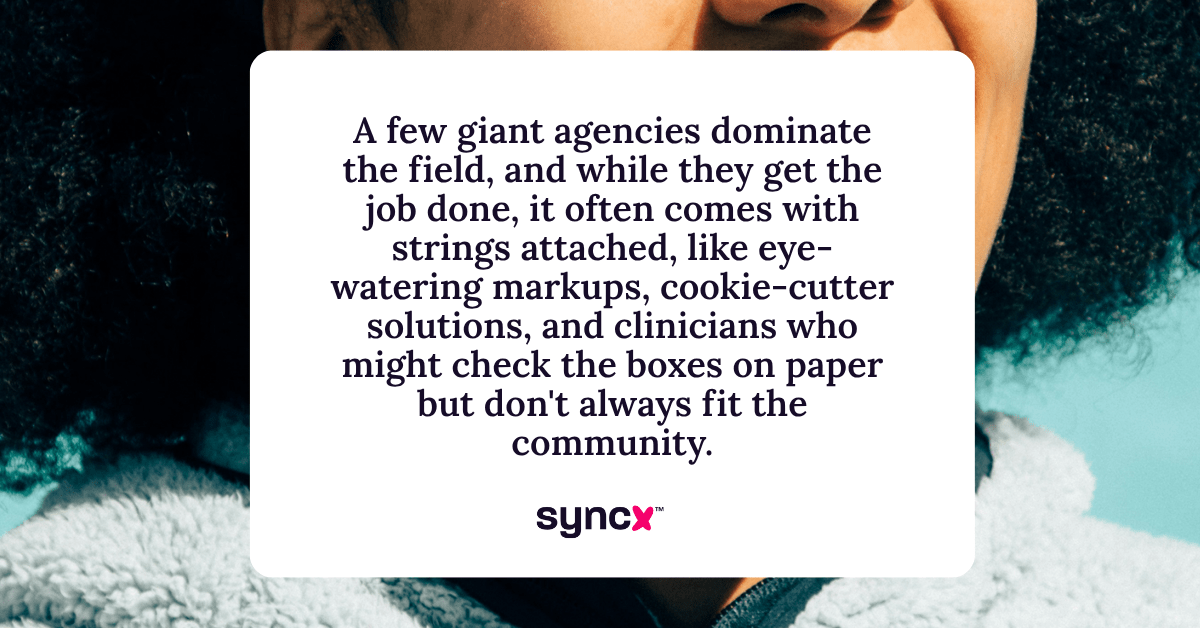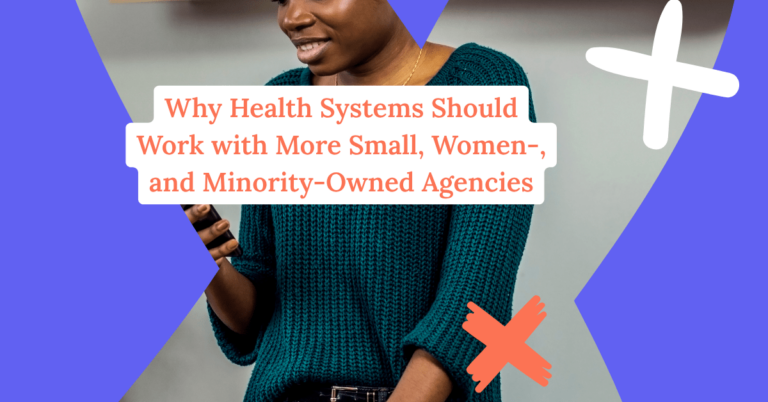The healthcare staffing industry is at a turning point. Between rising labor costs, complex compliance demands, and the constant pressure to fill shifts quickly, traditional methods of recruiting and workforce management are no longer enough. Manual processes lead to invoicing errors that trigger costly clawbacks. Slow credentialing delays placements for weeks. Underperforming agencies drain resources without delivering results.
But what if technology could turn these challenges into opportunities? AI-driven tools are now reshaping every facet of healthcare staffing, from automating repetitive tasks to helping predict staffing shortages before they happen. Platforms like Syncx are at the forefront, offering smarter ways to manage invoices, credentials, and talent pools while reducing risk and improving efficiency. In this blog, we’ll explore the innovations transforming the industry, and how forward-thinking organizations are leveraging them to work smarter, not harder.
The future of healthcare staffing is already here. Are you ready for it?
The Current State of Locum Tenens Staffing
Let’s be honest about how healthcare really gets staffed these days. Walk into any hospital administrator’s office and you’ll likely hear the same story: they’re leaning on temporary physicians more than ever to keep their doors open. Burned-out doctors leaving, not enough new ones coming in, and patient demand that never lets up have made locum tenens not just a stopgap, but a survival strategy.
The problem is that the temporary staffing industry doesn’t always offer what healthcare actually needs. A few giant agencies dominate the field, and while they get the job done, it often comes with strings attached, like eye-watering markups, cookie-cutter solutions, and clinicians who might check the boxes on paper but don’t always fit the community.
The numbers don’t lie. Nearly every hospital uses locum tenens now, especially after COVID stretched everyone to the breaking point. But dig a little deeper and you’ll hear the frustrations: rural hospitals can’t attract temporary docs willing to work in small towns, urban centers struggle to find physicians who speak their patients’ languages, and everyone’s getting squeezed by costs that keep climbing.
Meanwhile, the doctors taking these temporary assignments often feel like they’re just warm bodies filling shifts. Many tell us they get placed where the big agencies have contracts, not where their skills or passions could make the most difference.
The truth is, we can do better. With healthcare’s growing focus on equity, affordability, and personalized care, temporary staffing shouldn’t be the weak link when it could be one of our most powerful tools for change. Enter small, women- and minority-owned agencies.

Benefits of Partnering with Small, Women-, and Minority-Owned Agencies
When most hospitals think “locum tenens agency,” they picture the big national players. But there’s a whole world of smaller, diverse-owned agencies out there doing things differently – and getting better results. In an industry where staffing challenges are often met with one-size-fits-all solutions, small, women-, and minority-owned locum tenens agencies offer a different approach—one built on efficiency, connection, and adaptability. Here’s how they can help you:
Your Budget Will Thank You
These smaller agencies aren’t carrying the overhead of a 20-story corporate office, and it shows in their pricing. Without inflated management structures or layers of bureaucracy, there’s less margin being spread around, which means more cost savings passed on to you. They work with you to structure deals that actually make sense for your bottom line, and then put more of their margin back into the company itself.
As for physician compensation, most small agencies bend over backwards to offer highly competitive rates. That means they’re sending you happier, more fulfilled staff. For hospitals watching every dollar, this can mean the difference between barely scraping by and having real breathing room instead of bloated fees or “take it or leave it” contracts.
You’re a Name, Not a Number
Ever feel like your current agency could replace you tomorrow and not notice? That is far less likely with smaller agencies, who live and die by their relationships. Instead of being stuck in corporate silos, where teams work blindly without seeing the full picture, you get actual humans who know your hospital’s rhythms, your team’s quirks, and your patients’ needs.
Unlike the factory-like approach of big agencies—where you might deal with 10 different people for a single doctor, none of whom communicate—smaller firms often take a concierge approach. You get one dedicated expert who understands every part of the business, because everyone wears multiple hats and knows how the entire organization works together. That means faster solutions, deeper collaboration, no intentional ignorance, and partners invested in your success.
When something goes wrong (and let’s face it, it always does), you’ve got someone on speed dial who actually cares. More than that, you can often escalate to the highest levels of the company if it gets to that point. And because of that personal, hands-on service? Small agencies end up with better retention. That means no revolving door, just real partnerships built to last.
They Know How to Make the Industry Better
Many small agency owners have firsthand experience working inside the corporate giants, meaning they’ve seen what doesn’t work. That’s why they’re driven by something bigger than just market dominance. Instead of repeating the same outdated practices, they’re focused on improving the industry itself, whether that means creating fairer opportunities, fostering innovation, or simply doing right by their clients. Their mindset isn’t about squeezing out competitors; it’s about raising the bar for everyone. And when you partner with them, you’re not just getting a vendor: you’re gaining an ally who’s invested in real progress.
They Can Turn on a Dime
Need a last-minute pediatric neurologist? Looking for someone with very specific credentials? Smaller agencies aren’t weighed down by red tape, and they’re built to adapt quickly. Because everyone on the team is solution-oriented and wears multiple hats, they understand how the entire organization works together. No passing the buck between departments or waiting for approvals.
While the big guys are still “reviewing the request,” your smaller partner has already mapped out three solutions, and is working on a fourth. Speed, flexibility, and investment in your needs are major advantages of working with a team that knows how to pivot.
The Community Connection You’ve Been Missing
The healthcare staffing industry shouldn’t be a one-size-fits-all game, yet the top five companies control so much of the market that innovation stagnates. Smaller agencies change that dynamic. Many bring specialized certifications, whether as women-owned businesses, diversity-focused enterprises, or niche specialists, that actively expand opportunities rather than gatekeep them.
And these subtle differences translate into tangible results for you, including providers with unique backgrounds, agencies that truly understand cultural competency, and partnerships that open doors you didn’t know existed. Because these smaller teams are embedded in the communities they serve, they send providers who fit. Patients notice. Staff notice. And suddenly, those temporary placements start leaving a permanent impact.
The bottom line? In an industry where staffing often feels impersonal and transactional, these agencies are proving there’s a better way – one relationship at a time.
Busting Myths About Smaller Agencies
Sometimes when we suggest trying smaller agencies, we get some skeptical looks. People worry they can’t handle volume, lack experience, or might be harder to work with. But the truth is that those concerns rarely match reality.
Smaller agencies have learned to punch above their weight. They team up when big requests come in, move faster without corporate bureaucracy, and often have founders who trained at the big firms before branching out. And reliability? Their entire business depends on doing right by you, so they’re more motivated to get it perfect.
“Won’t they struggle with big staffing requests?”
Actually, many smaller agencies partner together to scale up when needed. They’re like the special forces of healthcare staffing: small teams that know how to call in reinforcements. Plus, without layers of bureaucracy, they often move faster than the big players.
“Aren’t they less experienced?”
Not even close. Most of these agency founders cut their teeth at the big firms before branching out. They keep all the expertise but ditch the corporate baggage. Many actually have stricter vetting processes because their reputation is everything.
How Health Systems Can Partner Effectively
Getting started with smaller agencies doesn’t have to be complicated. The smart move is to test the waters with a pilot that includes maybe one department or a specific staffing need so you can see the difference without overhauling your entire system. Tap into existing networks like local business councils or supplier diversity programs to find vetted partners, and don’t be shy about asking how they’ll handle the make-or-break details (think: last-minute cancellations or cultural fit). This is where your DEI goals can actually make life easier since these partnerships often deliver cost savings and help hit diversity metrics.
And remember, “small” doesn’t mean “less professional.” Demand the same guarantees on credentials and contracts, just with a team that treats you like a partner, not a ticket number. Once you experience staffing that’s truly tailored to you, those old-school agencies start feeling awfully impersonal.
Why Small, Women-, and Minority-Owned Agencies Are the Future
The healthcare staffing industry is at a turning point, and the future belongs to agencies that prioritize relationships over transactions, flexibility over rigidity, and community impact over corporate profits. Small, women-, and minority-owned locum tenens agencies aren’t just alternatives to the status quo; they’re proving to be the solution we’ve needed all along.
These agencies bring something fundamentally different to the table: a deep understanding that staffing isn’t just about filling shifts, but about building connections between providers, facilities, and patients. They’re the ones finding bilingual physicians for underserved communities, matching clinicians who share cultural backgrounds with their patients, and creating staffing solutions that actually respect hospital budgets.
As healthcare continues to grapple with burnout, health disparities, and financial pressures, these agencies are showing us a better way forward—one where temporary staffing strengthens communities rather than just extracting value from them. The question isn’t whether these agencies can compete with the big players, but why any health system would settle for less personalized, less equitable solutions when this alternative exists.
Work with a Managed Service Provider that Specializes in Supporting Women and Minority-Owned Agencies
Ready to experience the difference these agencies can make? Syncx is here to bridge the gap between innovative, diverse-owned locum tenens agencies and health systems looking for better staffing solutions. As a managed service provider specializing in women and minority-owned agencies, we’ve built a network of high-performing partners who deliver all the benefits we’ve discussed, like cost efficiency, cultural competency, and personalized service, with none of the headaches.
We handle the vetting, the contracting, and the ongoing management, so you get access to these game-changing agencies with the same ease as working with a single large provider. The result? Staffing that actually works for your facility, your patients, and your bottom line.
Don’t just take our word for it—see how it works. Book a demo with Syncx today and discover how partnering with purpose-driven agencies can transform your locum tenens strategy. Because better staffing isn’t just about who fills your shifts today, but about building a more sustainable, equitable system for tomorrow. Let’s create that future together.
